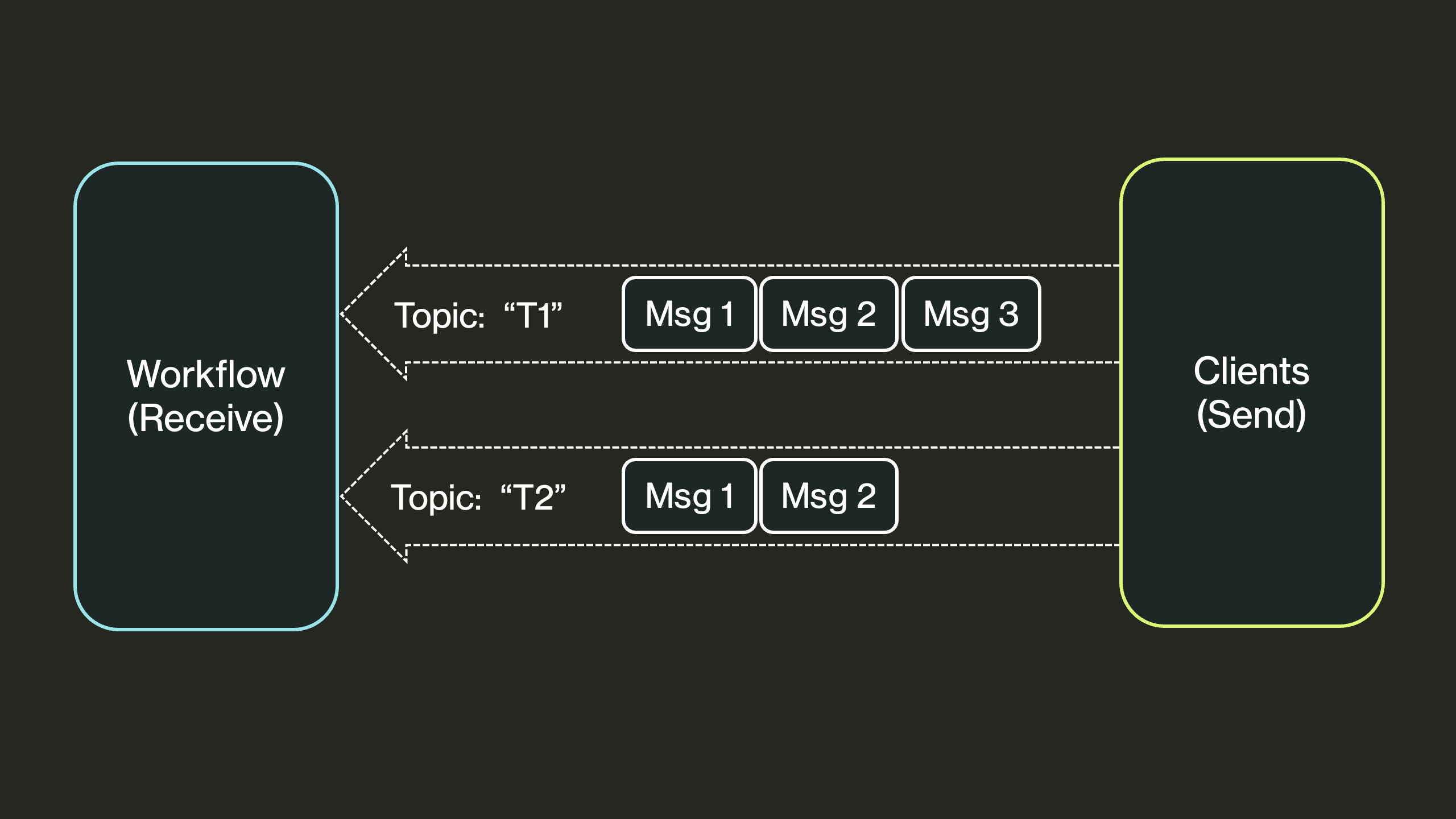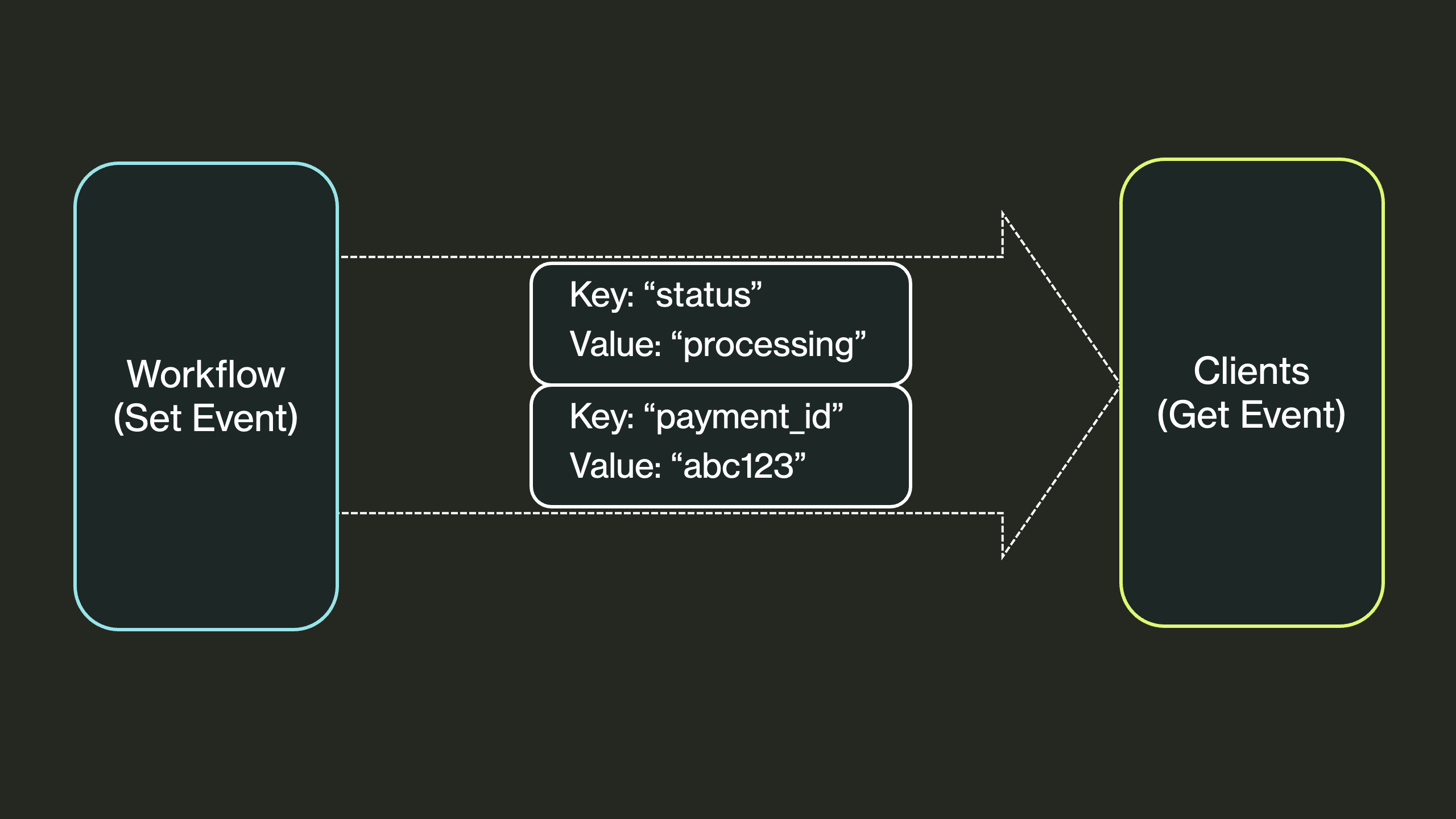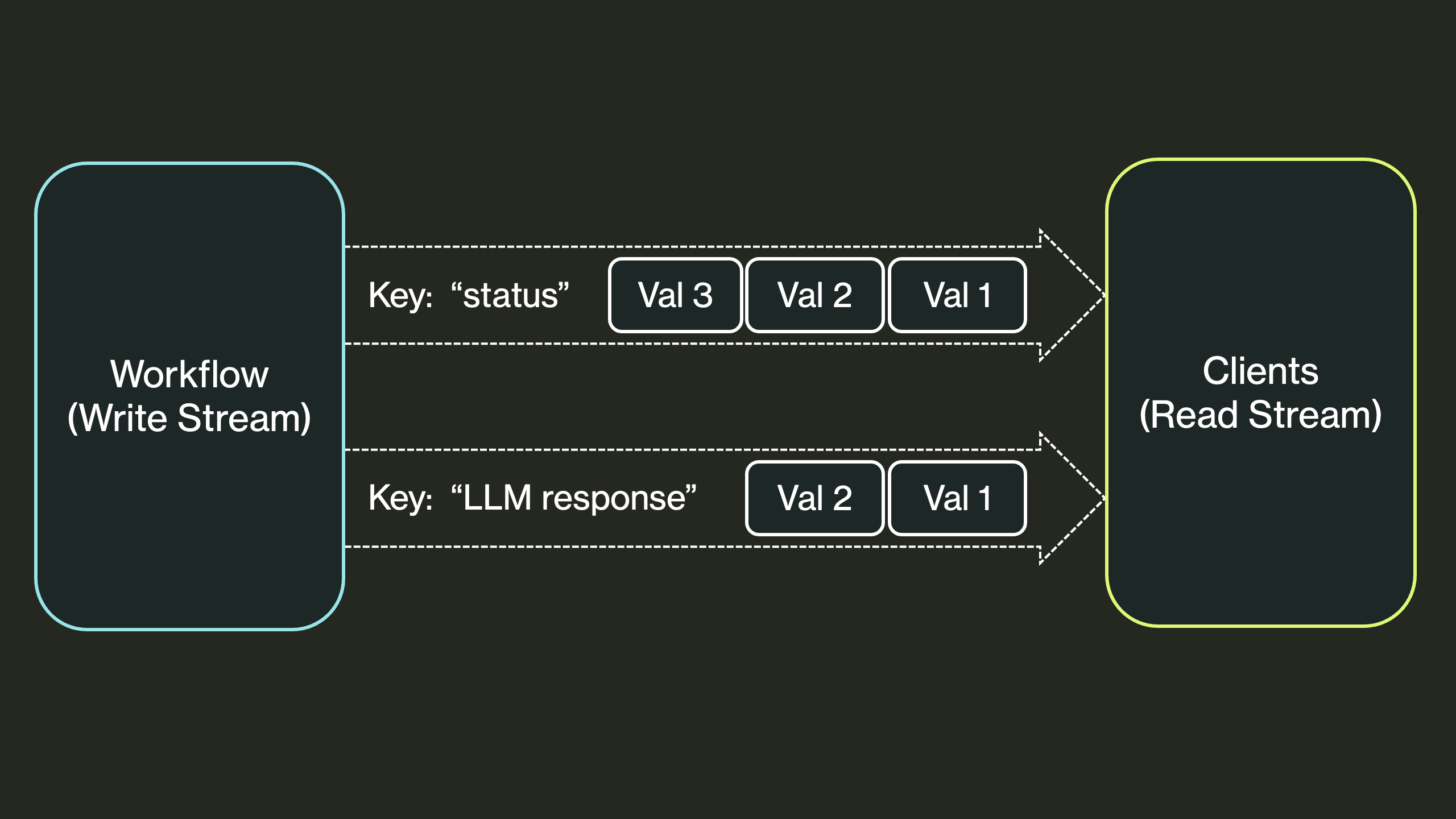Communicating with Workflows
DBOS provides a few different ways to communicate with your workflows. You can:
- Send messages to workflows
- Publish events from workflows for clients to read
- Stream values from workflows to clients
Workflow Messaging and Notifications
You can send messages to a specific workflow. This is useful for signaling a workflow or sending notifications to it while it's running.

Send
DBOS.send(
destination_id: str,
message: Any,
topic: Optional[str] = None
) -> None
You can call DBOS.send() to send a message to a workflow.
Messages can optionally be associated with a topic and are queued on the receiver per topic.
You can also call send from outside of your DBOS application with the DBOS Client.
Recv
DBOS.recv(
topic: Optional[str] = None,
timeout_seconds: float = 60,
) -> Any
Workflows can call DBOS.recv() to receive messages sent to them, optionally for a particular topic.
Each call to recv() waits for and consumes the next message to arrive in the queue for the specified topic, returning None if the wait times out.
If the topic is not specified, this method only receives messages sent without a topic.
Messages Example
Messages are especially useful for sending notifications to a workflow. For example, in the widget store demo, the checkout workflow, after redirecting customers to a payments page, must wait for a notification that the user has paid.
To wait for this notification, the payments workflow uses recv(), executing failure-handling code if the notification doesn't arrive in time:
@DBOS.workflow()
def checkout_workflow():
... # Validate the order, then redirect customers to a payments service.
payment_status = DBOS.recv(PAYMENT_STATUS)
if payment_status is not None and payment_status == "paid":
... # Handle a successful payment.
else:
... # Handle a failed payment or timeout.
An endpoint waits for the payment processor to send the notification, then uses send() to forward it to the workflow:
@app.post("/payment_webhook/{workflow_id}/{payment_status}")
def payment_endpoint(payment_id: str, payment_status: str) -> Response:
# Send the payment status to the checkout workflow.
DBOS.send(payment_id, payment_status, PAYMENT_STATUS)
Reliability Guarantees
All messages are persisted to the database, so if send completes successfully, the destination workflow is guaranteed to be able to recv it.
If you're sending a message from a workflow, DBOS guarantees exactly-once delivery.
If you're sending a message from normal Python code, you can use SetWorkflowID with an idempotency key to guarantee exactly-once delivery.
Workflow Events
Workflows can publish events, which are key-value pairs associated with the workflow. They are useful for publishing information about the status of a workflow or to send a result to clients while the workflow is running.

set_event
DBOS.set_event(
key: str,
value: Any,
) -> None
Any workflow or step can call DBOS.set_event to publish a key-value pair, or update its value if has already been published.
get_event
DBOS.get_event(
workflow_id: str,
key: str,
timeout_seconds: float = 60,
) -> None
You can call DBOS.get_event to retrieve the value published by a particular workflow identity for a particular key.
If the event does not yet exist, this call waits for it to be published, returning None if the wait times out.
You can also call get_event from outside of your DBOS application with DBOS Client.
get_all_events
DBOS.get_all_events(
workflow_id: str
) -> Dict[str, Any]
You can use DBOS.get_all_events to retrieve the latest values of all events published by a workflow.
Events Example
Events are especially useful for writing interactive workflows that communicate information to their caller. For example, in the widget store demo, the checkout workflow, after validating an order, needs to send the customer a unique payment ID. To communicate the payment ID to the customer, it uses events.
The payments workflow emits the payment ID using set_event():
@DBOS.workflow()
def checkout_workflow():
...
payment_id = ...
dbos.set_event(PAYMENT_ID, payment_id)
...
The FastAPI handler that originally started the workflow uses get_event() to await this payment ID, then returns it:
@app.post("/checkout/{idempotency_key}")
def checkout_endpoint(idempotency_key: str) -> Response:
# Idempotently start the checkout workflow in the background.
with SetWorkflowID(idempotency_key):
handle = DBOS.start_workflow(checkout_workflow)
# Wait for the checkout workflow to send a payment ID, then return it.
payment_id = DBOS.get_event(handle.workflow_id, PAYMENT_ID)
if payment_id is None:
raise HTTPException(status_code=404, detail="Checkout failed to start")
return Response(payment_id)
Reliability Guarantees
All events are persisted to the database, so the latest version of an event is always retrievable.
Additionally, if get_event is called in a workflow, the retrieved value is persisted in the database so workflow recovery can use that value, even if the event is later updated.
Workflow Streaming
Workflows can stream data in real time to clients. This is useful for streaming results from a long-running workflow or LLM call or for monitoring or progress reporting.

Writing to Streams
DBOS.write_stream(
key: str,
value: Any
) -> None:
You can write values to a stream from a workflow or its steps using DBOS.write_stream.
A workflow may have any number of streams, each identified by a unique key.
When you are done writing to a stream, you should close it with DBOS.close_stream.
Otherwise, streams are automatically closed when the workflow terminates.
DBOS.close_stream(
key: str
) -> None
DBOS streams are immutable and append-only. Writes to a stream from a workflow happen exactly-once. Writes to a stream from a step happen at-least-once; if a step fails and is retried, it may write to the stream multiple times. Readers will see all values written to the stream from all tries of the step in the order in which they were written.
Example syntax:
@DBOS.workflow()
def producer_workflow():
DBOS.write_stream(example_key, {"step": 1, "data": "value1"})
DBOS.write_stream(example_key, {"step": 2, "data": "value2"})
DBOS.close_stream(example_key) # Signal completion
Reading from Streams
DBOS.read_stream(
workflow_id: str,
key: str
) -> Generator[Any, Any, None]
You can read values from a stream from anywhere using DBOS.read_stream.
This function reads values from a stream identified by a workflow ID and key, yielding each value in order until the stream is closed or the workflow terminates.
You can also read from a stream from outside a DBOS application with a DBOS Client.
Example syntax:
for value in DBOS.read_stream(workflow_id, example_key):
print(f"Received: {value}")